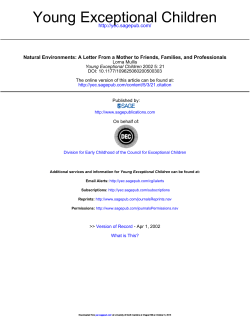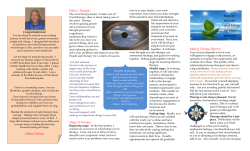
Working with Speech and Language Therapists
Working with Speech and Language Therapists Before you begin planning your work on the Communication Commitment, you should consider the links you already have with Speech and Language Therapists and their role in supporting you and your pupils with speech, language and communication needs. What is speech and language therapy? Speech and language therapy is concerned with the identification, assessment and support of speech, language, communication and swallowing needs of children, young people and adults. SLTs are allied health professionals. They work closely with parents, carers and other professionals, such as teachers, nurses, occupational therapists and doctors. There are around 13,000 practising SLTs in the UK. The Royal College of Speech and Language Therapists (RCSLT) is the professional body for speech and language therapists in the UK, providing leadership and setting professional standards. Every speech and language therapist is required to be registered with the Health and Care Professions Council. You can find more information about speech and language therapy and SLTs at www.rcslt.org.uk Many SLTs are employed by the NHS, some are employed through local authority support services, some work in independent practice and others work for third sector organisations. Therapy services often vary across different areas of the country, providing different models of service to local schools. The role of Speech and Language Therapists in school Schools can work directly with local therapy services; as a school, you may well have a relationship with your local SLT service either directly or perhaps through your local authority. Some schools employ their own speech and language therapist or commission therapy services from one of their local providers. Find out more information overleaf on commissioning speech language therapy in school. Speech and language therapists play an important role in supporting schools to meet the needs of children with SLCN and in supporting good practice across universal, targeted and specialist approaches. They have a distinct role in assessing, planning, delivering and evaluating support for children and young people with a range of speech, language and communication needs. SLTs play a key role in diagnosis of children with different speech, language and communication needs. All children need environments which support development of speech, language and communication skills; this can make a difference for typically developing children as well as those with SLCN. Speech and language therapists are key partners for schools/local authorities and early years settings where they can: • • • Support senior leaders to ensure communication-supportive practice throughout their school or setting and support long-term planning for children with SLCN. Provide assessment, including screening or more specific assessment of individuals to determine specific areas of need and strategies to support development. Input to formal assessment processes for children who have long-term SLCN and who may need a statement of special educational needs. The Communication Commitment is run by The Communication Trust and sponsored by Pearson • • • • • • • Provide workforce development, including training, coaching and modelling support for other adults. Deliver programmes for specific groups or individuals. Work closely with families and other professionals. Support good practice in the classroom. Support educational target setting and evaluation. Work with others to support targeted interventions and support for children. Play a vital role in working directly with the child with specific SLCN as well as support the teachers and teaching assistants to differentiate the curriculum appropriately, and provide necessary training. How to commission a speech and language therapist Schools are increasingly becoming commissioners of speech and language therapy services. The RCSLT's ‘Guidance on Quality Standards for Local Authorities and Schools as Commissioners of Speech and Language Therapy Services’ highlights the quality standards that are priorities for schools to adhere to in the commissioning process. This document gives guidelines and quality standards for speech and language therapy services commissioned by schools/local authorities so you can ensure you have an appropriate, effective and safe service from whichever provider you choose to commission. It has been compiled by speech and language therapists working in the NHS and independently who have experience in working in a wide variety of educational settings, and from standards developed by the RCSLT and the regulatory body, the Health & Care Professions Council. The relevant standards and guidance can be found in the boxes at the end of each section. The Association of Speech and Language Therapists in Independent Practice (ASLTIP) provides information about independent speech and language therapists throughout the UK and advice on fees at http://www.helpwithtalking.com. All ASLTIP members are certified RCSLT members and are registered with the Health Professions Council. The role of Speech and Language Therapists in the Communication Commitment If your school works with an SLT, before you start on your commitment journey you should discuss your plans with your SLT as their professional expertise could contribute to all five of the priority areas of the Commitment. An SLT will have expertise that will help you on a range of issues including how to establish communication-friendly classrooms, offering formal and informal training to teaching staff, joint teaching with teachers on specific issues, following up classroom activities to ensure children have understood vocabulary etc as well as providing assessment and intervention that is integral to priority area four supporting children with SLCN. Why not share your innovative ways of working with SLTs in the 'Share Your Stories' section of the Commitment site? The Communication Commitment is run by The Communication Trust and sponsored by Pearson
© Copyright 2025





















